What weighs roughly three pounds, has more wrinkles than a Shar Pei, contains invisible cells that stack up to 5,000 miles, and fits snugly into the space between your ears?
A simple brainteaser, perhaps, but the human brain is nowhere near simple.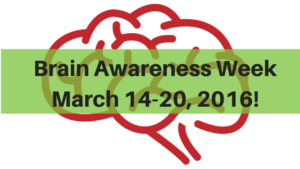


It contains our memory, consciousness, and personality. It enables our five senses and regulates our movements. And, it never stops changing.
The brain’s ability to rewire and remap gives us the ability to adapt to change and to recover from trauma. Neuroplasticity is just one of many brain discoveries fascinating scientists today. Just like the brain itself, research about the brain is always changing.
March 14 to 20 is Brain Awareness Week. Celebrate by making sure you’re aware of all the super powers contained inside your brain. To boost your knowledge, check out the books we’ve collected below for a balanced overview of what goes on inside our heads.
Brain Rules, by John Medina, Ph.D.
What do the brains of toddlers and teenagers have in common? How can your sense of smell improve your ability to learn? When are you most likely to zone out during a lecture or presentation? In Brain Rules, developmental molecular biologist John Medina 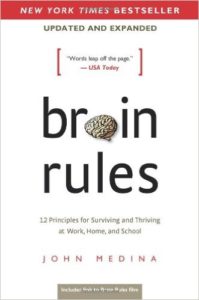


What We Loved: This slim volume provides a great overview of what researchers now understand about the brain. The latest edition was updated in 2014. Each chapter also ends with quick reader takeaways, including a summary of key points and appealing ideas for helping our brains to thrive. Incorporating naps and exercise breaks into the work day? Tell us more!
The Mind’s Eye, by Oliver Sacks, M.D.
A concert pianist finds she can no longer read sheet music, or later, any words at all, but she still pens letters to her friends. A writer loses his ability to read after suffering a stroke, but through tireless journaling and perseverance, publishes his memoir. An acclaimed neurologist sometimes fails to recognize himself in the mirror, and apologizes for bumping into the stranger. 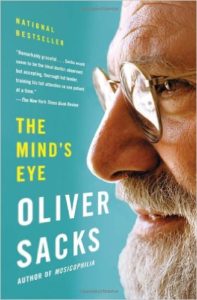


What We Loved: In this book, Sacks shares the stories of remarkable people during some of their most difficult and fantastic journeys. Most memorable, however, may be the stories from Sacks’s own life. He describes how he came to realize that both he and his brother have lived their whole lives with face blindness. He also chronicles the treatment of a melanoma in his eye that affects his vision through intimate journal entries. Don’t forget to check out Sacks’s many other contributions to the literature of neuroscience, including An Anthropologist on Mars, Musicophilia, and his memoir, On the Move.
My Stroke of Insight, by Jill Bolte Taylor, Ph.D.
Not many people, after realizing that they are having a stroke, would think, “Wow, this is so cool!” For neuroscientist Jill Bolte Taylor, however, this was one of the many thoughts that surfaced as blood flooded the left hemisphere of her brain. Other thoughts and 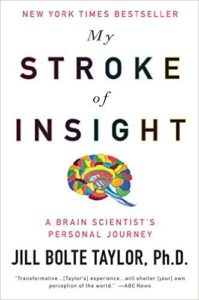


What We Loved: Best known for her powerful TED Talk, Taylor not only has a helpful story for patients, but an equally important message for caregivers, family members, and medical professionals. With experience both as a scientist and a patient, she explains what caregivers can do to improve the patient experience. She valued people who would make eye contact, slow down their speech, and let her get lots of sleep. Other exercises that worked well for her included watching old videos of herself, being asked to extend her thoughts through multiple choice questions versus yes/no questions, and re-learning colors and shapes with toddler puzzles and toys. These tips are collected with many others in two appendices.
[tweet_box design=”default”] 5 must-read books that will boost your knowledge about the incredible human brain[/tweet_box]
Quirk: Brain Science Makes Sense of Your Peculiar Personality, by Hannah Holmes
Zodiacs, horoscopes, true color tests, Myers-Briggs types, blood type traits. We humans have long displayed a strong desire to identify and classify who we are. In Quirk, science writer Hannah Holmes connects personality back to the brain. Using the Five Factor Model most often accepted by psychologists, she explores the neurotransmitters and chemicals that make us the way we are. 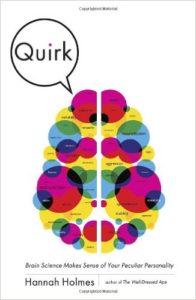


What We Loved: For Holmes, there is no definitive personality type. We all carry many traits, even some that make us a little quirky or strange. What if some disorders were simply “difforders,” Holmes asks, exploring the way our culture values certain traits over others. “A personality can be called a disordered or diseased one if it causes, you know, dis-ease,” she writes, “And that dis-ease is often caused by your culture, not your biology.” Even when biology does impact behavior, Holmes suggests that we can still be masters of our minds. Understanding how our brains work give us the chance to take back the driver’s seat.
Why Life Speeds Up As You Get Older, by Douwe Draaisma
Researchers have coined many terms and phrases to describe different types of memory and how they work. Autobiographical memory, working memory, flashbulb memory, photographic memory — these are just a few. 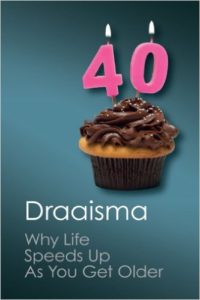


What We Loved: A professor of the history of psychology, Draaisma steps out of the science laboratory to look at memory and the mind from a larger scope. While he recounts home experiments and popular theories, he also brings in literature, art, and personal narrative. This wide lens shows that the knowledge we now hold has come from many diverging paths, and has yet to yield a clear landscape. The mind remains a place of mystery and wonder.
For more health stories about the remarkable brain, try reading:
- Changing Lanes: Life After a Traumatic Brain Injury
- Have a Word with Herb about Aphasia Awareness
- Back in the Driver’s Seat After Brain Injury
- Pseudobulbar Affect: Struggling with Emotional Control

